Days of Alexandrov medal beginning
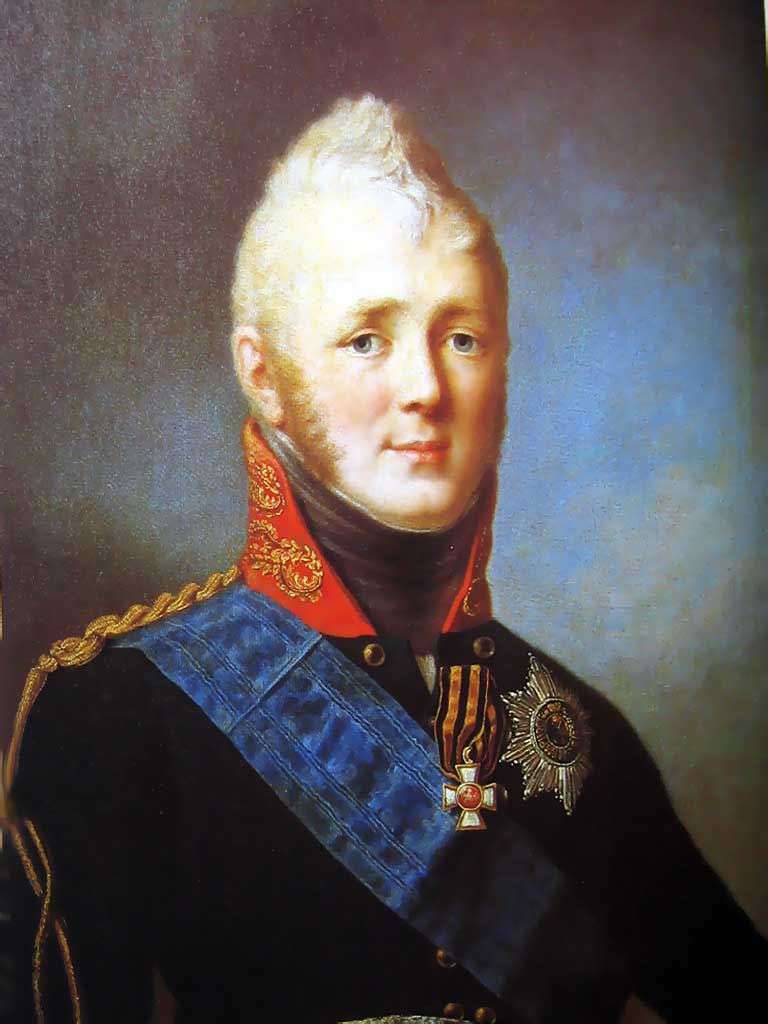
At the court of his father, Paul I, the future emperor behaved dreamily and defiantly, paying tribute at the same time to two of the most fashionable trends among the “golden youth” of that time - political liberalism and aesthetic sentimentalism. So, for example, he liked to say in a narrow circle that, having come to power (the crown prince wisely did not specify exactly how he would do it), he grants the people a Constitution and will resign from the throne to spend the rest of his life in some pretty house on the picturesque the bank of the Rhine.
Oddly enough, he kept both promises, albeit with major reservations. The Constitution was indeed granted to them, but not to Russia, but to Poland attached to it in 1815. As for the second, that is, leaving “to the world”, we, following Prince Vladimir Baryatinsky and Daniel Andreev, are inclined to at least take seriously the famous (however, let's be fair, not fully convincing) “legend” according to which Alexander the Blessed he did not die in 1825, in Taganrog, but went, “with spiritual thirst we torch”, a long-term journey. True, not to the west, as planned in his youth, but to the east, to Siberia.
However, this will happen later, but in the meantime, having brushed a melancholic tear about the news of the just-done regicide reported to him by Count Palen in the middle of the night of 12 (24) in March 1801, announced to the awaiting troops, “Alexander the priest died with a stroke of apoplexy, ”and he pointedly added that everything would be with him as with a grandmother. On the same day, these words were repeated (it is possible that they were thought out and prepared in advance) and gained official status in the Manifesto on accession to the throne:
"We vosprіemlya hereditary Imperatorskіy Vserossіyskіy Prestol, vosprіemlem kupno and duty to manage a God Nam handed narod on zakonam and heart unto died grandmother ours, Empress Catherine Velikіya, koeya memory Nam and throughout the Fatherland forever prebudet gracious, but by Her premudrym intending to march, let us reach Russia to the top of glory and deliver undisturbed bliss to all our faithful to Ours ... "
Of course, the duty of awarding medals was perceived “hereditarily” and “kupno” - an industry that reached its heyday with the “august grandmother” and was probably out of favor during the time of the “father” reign.
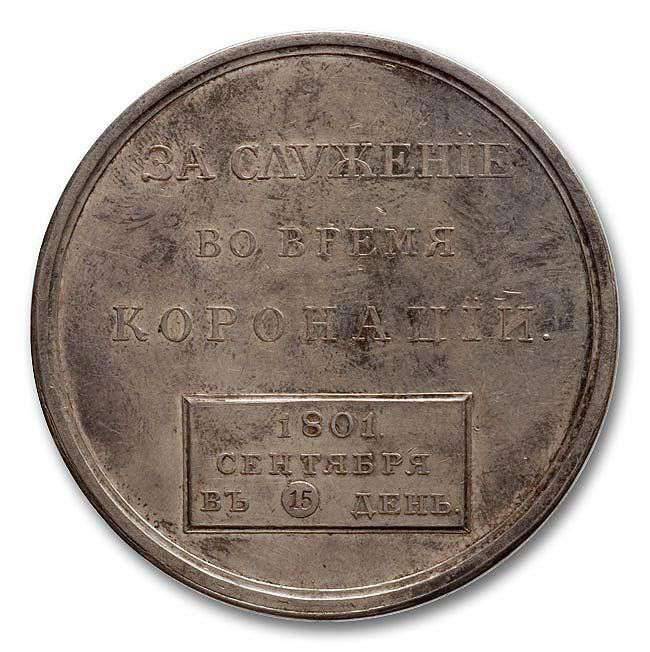
In the summer of the same year, especially for the coronation Moscow celebrations that took place later, in September, they produced the medal “For the ministry during the coronation” (master - Karl Leberecht) in a long series of Alexander's awards. We will not be distracted by its description. The reason for her presentation is clear from the title.
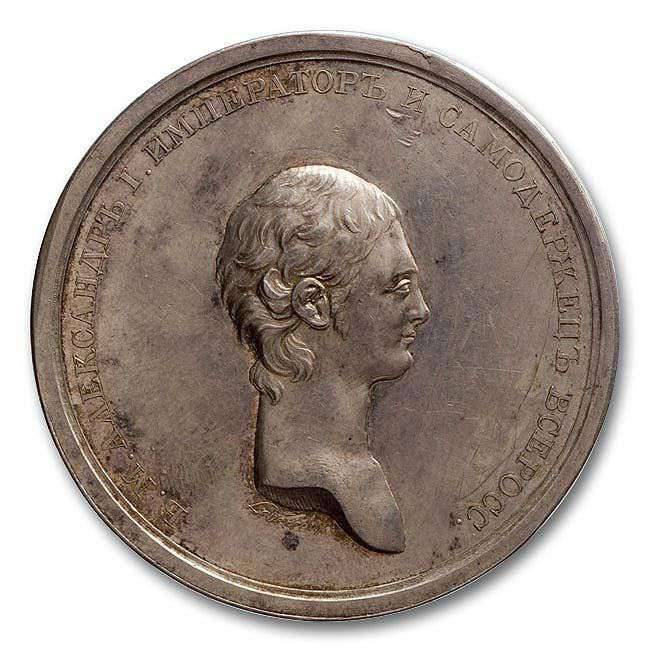
This was followed by some more interesting, albeit not very impressive medals, which, however, it would not be enough to simply list them. story not limited to the coronation, nor even the reign of Alexander.
Such is, for example, the medal "For useful". Silver or gold, with the profile of the emperor on the obverse and the inscription on the reverse that changed over time, it was given out to merchants and commoners for various services to the government, as well as large donations to charity. It was necessary to carry it on ribbons of the Anninsky, Vladimirsky or Aleksandrovsky orders, depending on the value of merit.
This medal was a variant of another, more diverse in composition, awarded the medal "For Diligent Service." The owners of it could be the Khan Kirgiz-Kaisack Horde "for his zeal for the throne, for moving to the local side of the Urals with thirty thousand tents," and a simple carpenter of the Tsarskoye Selo palace government "for excellent service and special art in work", and a German colonist Köhler "for working as a teacher for 24's years."
No less curious is the medal "For Diligence", established simultaneously with the medal "For useful". Here is an example of awarding it. In 1809, this medal was presented to the Yakut merchant Gorokhov "for the head of an unknown beast found on the shores of the Arctic Ocean." Useful thing!
In the 1799 year, expressing a desire to “sacrifice a pleasant life to the good of the kind fatherland”, Russian chemist and mineraologist Apollos Musin-Pushkin went to Transcaucasia (he was not just Apollos, but Apollos Apollosovich - his father, the president of the Russian mining industry, Berg-colleagues, called Apollos Epaphroditovich). In addition to the scientific Musin-Pushkin, he carried out a diplomatic mission in Tiflis, the result of which was the accession of Georgia to Russia in the 1801 year.
For members of the expedition, in 1802, in several copies, a special medal was ordered to be worn on the red ribbon of the Alexander Order with the inscription on the reverse side: “Compensation for the zeal rendered during the expedition by the secret adviser Musin-Pushkin for ore mining in the ranges of the Caucasus and Ararat mountains ".
The history of the transition of Georgia (more precisely, the Kartli-Kakheti kingdom) under the auspices of Russia, and then its entry into its structure is long and dramatic. Peter I, to put it mildly, strongly summed up the Georgian king Vakhtang VI at one time, suddenly interrupting his Persian campaign widely advertised among Transcaucasian Christians. As a result, Vakhtang lost the throne and was forced to take refuge in Russia, where he soon died.
Following the king to the north, many were drawn from the shores of Aragva and Kura. For example, the side son of one of the Kartlian kings, the grandfather of our famous Bagration Alexander and his son Ivan, ended up in Russia.
In the Russian-Turkish war 1768 – 1774 in Transcaucasia, the Russian corps of Count Gottlob Totleben acted not without success, his personality was quite remarkable. “Dashing Saxon in the Russian service” distinguished himself by courage at Kunersdorf, took Berlin in 1760 (or rather, captured the glory of the Prussian capital’s occupation under the nose of the less resourceful Zakhara Chernyshev and Moritz Lassi), the following year he was accused of Prussian treason and sentenced to the death penalty, then pardoned by Catherine, served in the Caucasus as a private and was soon restored to the rank.
The name of this typical for the XVIII century adventurer already during his lifetime was overgrown with numerous legends. One of them in his “History of the Pugachev Riot” was later recorded by Pushkin. According to her, Totleben in Germany accidentally drew attention to the external similarity of one Cossack with the heir to the Russian throne, the future short-term tsar Peter III, thereby embarrassing the gullible Cossack soul.
The Georgian king Heraclius II, in spite of his personal enmity with Totleben, who almost ended in a rather pitiable state for him, stubbornly sought ways to hide under the protection of a powerful Christian power. He agreed to vassal dependence, as before from Iran. But in the words of the diplomat (and the conspirator who acted in favor of Pavel) Count Nikita Panin, “strange and not by the time committed” proposals were first met with a cold reception in Petersburg.
However, after a decade, it was they who formed the basis of the St. George Treaty, to which we are obliged to begin the construction of the Georgian Military Highway and to found Vladikavkaz. Taking this opportunity, we will decipher the name of the fortress completely: “Own Caucasus”. He invented it, of course, the poet - General Count Pavel Potemkin.
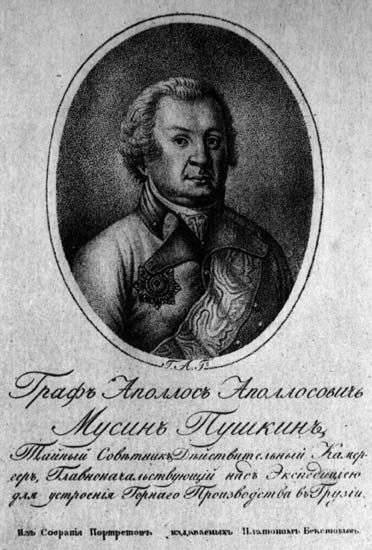
The count really was a good rhyming and a participant in the Suvorov storming of Ishmael, to whom he later devoted a poetic work - the drama “Zelmir and Smelon” in three acts. Although much more known at that time was the spouse of General Praskovya Zakrevskaya, maid of honor of the Empress, one of the most vicious Petersburg beauties, the lover of another Potemkin, Tavrichesky, Field Marshal and favorite of Catherine.
The conclusion of the treatise, by the way, is marked by a commemorative medal with the profile of the empress on the obverse and the inscription on the reverse:
"FAITH AND FAITH".
In essence, he was only the first step on the difficult path to the accession of Georgia. The declared loyalty was fragile and did not last long: Georgia still did not fall in time for Russia, and King Heraclius himself soon began to doubt, and after three years, in 1787, he entered into a separate deal with Turkey, which in fact denounced the agreement with the Russians .
The Turks suffered a crushing defeat in the 1787 – 1792 war and officially refused any species to Georgia. However, Iran immediately turned against her: in September, the 1795 of the Persian hordes of Aga-Mohammed-Khan defeated the Georgians who remained without protection in the Krtsanisi battle, seized Tbilisi and committed a monstrous massacre there.
In response, the Russian corps under the command of Valerian Zubov invaded Dagestan, stormed Derbent and was quite capable of “washing the boots in the Indian Ocean” at the same time, when the death of Catherine II suddenly confused all the cards to the Russians.
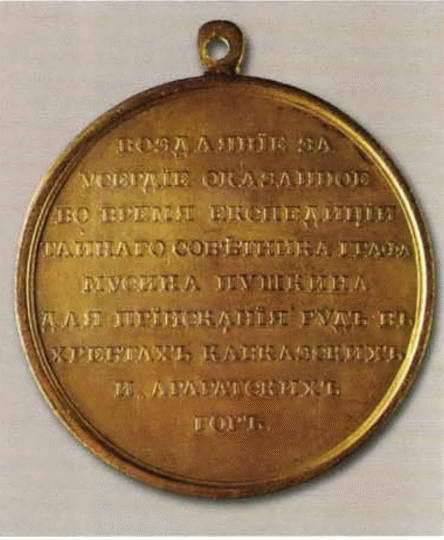
Commander-in-Chief of Teeth, as the brother of the last favorite of the Empress, Plato, was hated by Paul I, and for the sake of revenge, he chose to immediately stop the campaign that had been successfully launched. The troops were recalled, and poor Zubov was not even given a personal order to return - let him remain one on one with the Persians.
A few words should be said about this darling of fate. The passion of an elderly Catherine for his elder brother allowed Valerian at 25 to become General-in-Chief. For comparison: the great Suvorov received the same title in the 1886 year - in 56 years!
Thrown up with money, villages and orders, awarded with ranks not for years, the young man did not hesitate to beg for all new honors. So, being granted by King Frederick to the Knights of the Prussian Order of the Black Eagle, Valerian immediately hinted his brother transparently that according to the regulations, this order can be worn only by a person not less than the rank of lieutenant-general (he himself was at that time just promoted to general -mayors).
For all that, our clerk was distinguished by personal courage, sometimes reaching the point of recklessness. Molodetskaya boldness brought him a well-deserved “George” IV degree for storming Ishmael, in Poland she also led to scandals around handsome cupids with married ladies, on one of which, Countess Potocki, he was eventually forced to marry, and then there too to a wound in the leg with a nucleus followed by amputation (Zubov then wore a German prosthesis that cost a fortune).
Opala Valerian evoked one of the best late works of the world, an ode to The Return of Count Zubov from Persia (1797). The high-ranking poet has already managed to glorify the young man when he was at the pinnacle of good luck (the ode "To the Handsome" and "To Conquer Derbent"). With a change of fate, the chances of becoming the addressee of the new poetic messages of Valerian were, frankly speaking, small.
Such a rather provocative thought was once expressed at the court of Derzhavin by Prince Sergei Golitsyn, with a venomous adduction that now there is no advantage to flatter. Gavriil Romanovich coldly objected: out of self-esteem, he never changes his thoughts and does not flatter anyone, but writes according to the suggestion of his heart.
“You can't write him today,” Golitsyn continued to bully. "You will see," Derzhavin replied, and when he arrived home, he immediately took up a new ode.
The purpose of our life is the goal of peace;
We are passing this way,
To from mra il or from the heat
Under the shelter night rest.
Here we meet the rapids
There are thorns, there are streams in the shadows,
There are soft meadows, plains,
There are dull, there are clear days;
This one falls down into the abyss,
And he climb in a hurry to the hill.
Etc.
These poems, of course, were published under the new emperor, the death of the “father” of which Valerian contributed, but survived the victim for a while.
And just before the death of Paul, his long-time goal — peace — was finally acquired by Georgia. A manifesto made public in St. Petersburg in January 1800 said:
“We declare to our emperor our word that, upon the accession of the Georgian Kingdom for all time, our power will not only be granted and will be \ ... \ all the rights, advantages and property legitimately owned by everyone, but that from now on every state has the above mentioned areas to use those rights, liberties, benefits and advantages, such as the ancient subjects of Russia, by the grace of our ancestors and Ours, enjoy under Our cover. ”
And God's grace is gone
To Georgia! She bloomed
Since then, in the shadow of their gardens,
Not fearing enemies
Beyond friendly bayonets.
So later painted another Russian poet.
In Russia, however, there was still no unequivocal opinion on the expediency of joining the Georgian “gardens”. The young liberal on the Russian throne, in a conversation with Prosecutor General Alexander Bekleshov, spoke of “utter disgust” and that he “deears unjust appropriation of someone else’s land”. Nevertheless, the local royal power in Georgia was liquidated and replaced by direct control from St. Petersburg. And soon they had to put into action “friendly bayonets”.
The highlanders' raids became more frequent (the Ossetians, for example, completely destroyed the Cossack regiment, and the Avars - an infantry battalion). In 1802, General Pavel Tsitsianov, a descendant of the Georgian princes who had moved to Russia under Peter, was sent to Tiflis.
“Between the first duties of yours,” the emperor, who had already begun to like the reign, wrote to him, “You will accept all beliefs, insistence and, finally, the most compelling call of all troubled princes, and especially Queen Daria (widow of Tsar Irakli II. - M. L.) to Russia. I consider this to be the main thing to calm the people, at the sight of their plans and movements, which do not cease to fluctuate in the order established for happiness. ”
“Calming” demanded first of all the subordination of a dangerous neighbor, the Ganja Khanate. 3 (15) January 1804, the capital of the Khanate was besieged and taken by assault. Khan Javad, who had once once surrendered to the Russians and swore allegiance to the empire, and then swiftly turned to the Persians, this time resolutely rejected several offers of surrender one after another and, vowing to die on the walls of the city, kept his promise; up to one and a half thousand defenders died with him.
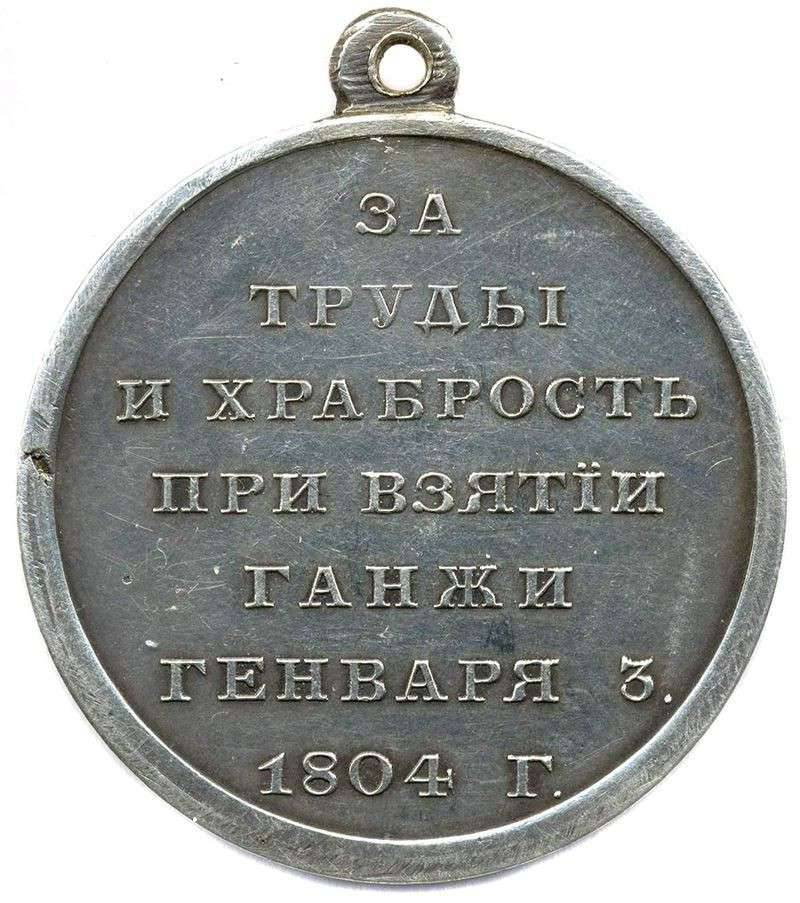
The fate of the rest of Ganja people, including civilians, turned out to be different. While none of the order of nine thousand women taken by the khan to the city from the villages as a pledge of the faithful service of their husbands, and not one baby died (Tsitsianov in the report specifically noted in the troops entrusted to him “the philanthropy and obedience to orders, until now storming is unheard of ”), about five hundred men were slain in the Juma mosque, turned into the church the next day, after rumors spread among Georgians who were in the troops of Tsitsianov that highlanders, their mortal centuries-old enemies, took refuge in the mosques.
Silver medals for the lower ranks - participants of the siege of Ganja - are decorated with the monogram of Alexander I on the obverse and a seven-line inscription on the reverse:
"FOR - WORKS - AND BRAVITY - WHEN TAKEN - GANJI - GENERAL 3.— 1804."
The medal was intended to be worn on the Alexander Ribbon.
It is known that Pavel Tsitsianov opposed mass rewarding and demanded that instead of almost four thousand only a little more than one and a half thousand copies of the medal should be distributed to the direct participants of the assault. At the same time, the already made “manets” were supposed to be melted down and minted new ones, removing the word “works” from the legend on the reverse and adding the word “storm” (“For bravery when taking Ganja by storm”). The rest of the silver should have been sold and the church in Tiflis built with the money raised.
Consent was received from Petersburg, but the matter was delayed as usual; in 1806, Tsitsianov was treacherously murdered in Baku (after announcing the peaceful surrender of the city, the Baku Khan had set up a trap: the General Commander who had approached the gates of the city was shot and beheaded, and the Khan sent a head to the Persian Shah. He left the commander without a small Russian detachment) and there were no other fighters for the “purity” of the medal.
By taking Ganja, Russia became involved in a long sluggish war with Persia (it was marked by the curious 1804 gold medal of the year “For the bravery shown in the battle with the Persians”, which was awarded to two Cossacks - Surkov and Egorov, Esaul of Tersk and Grebensky troops, as part of a small detachment seized the Persians banners and guns), and at the same time in the "Great Game" with England, pushed around the then Shah in Tehran. While in the west, in the north and south, new enemies of the Russian state were gaining strength and raising their heads.
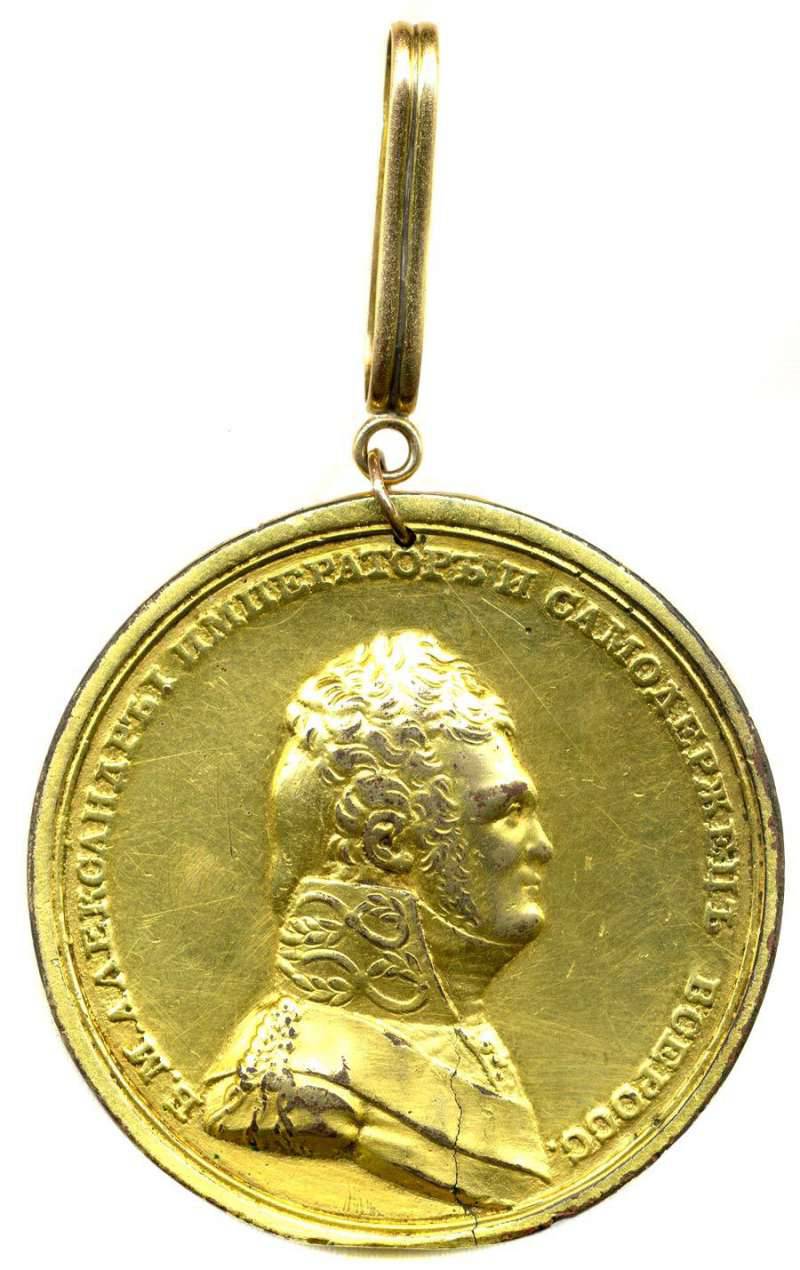
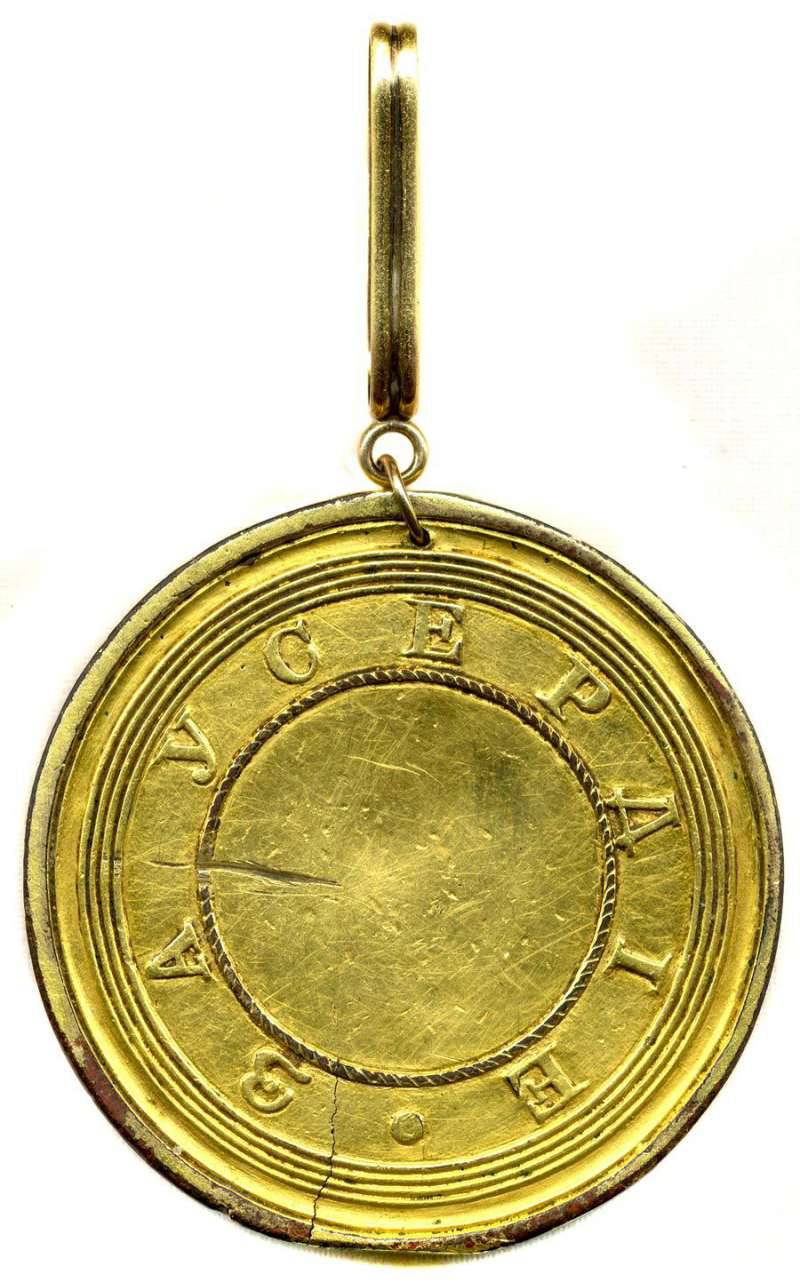
Information